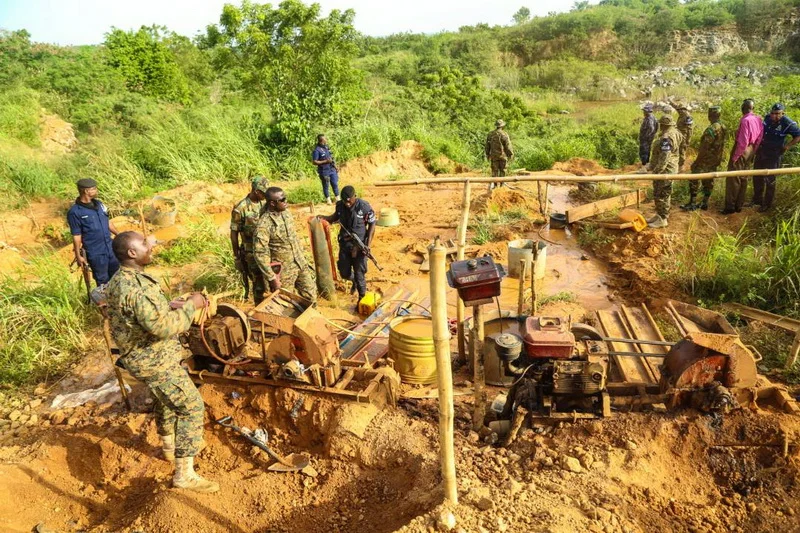The Minister for Lands and Natural Resources, Emmanuel Armah-Kofi Buah, has underscored the urgent need for a complete overhaul of Ghana’s mining licensing regime, calling for a more structured and localized approach to addressing illegal and unregulated mining activities.
The minister stressed that the reform is critical to reversing the environmental devastation caused by illegal mining, known locally as galamsey. He emphasized that tackling the crisis requires strong political will and assured Ghanaians of President John Mahama’s commitment to the cause.
“We must completely reform the licensing regime and strengthen law enforcement. This requires political will and leadership, and I am very clear in my mind about the support and commitment of President John Mahama.
“He has given me clear instructions—this fight must be won for the people of Ghana, for our forests, our water bodies, and our future.”
Emmanuel Armah-Kofi Buah, Minister for Lands and Natural Resources
As part of the reforms, the Ministry of Lands and Natural Resources will establish District Community Licensing Committees composed of members from the District Security Council (DISEC) and other key stakeholders.
This decentralized approach is expected to ensure greater transparency and accountability in granting mining licenses, ultimately reducing illegal mining activities.
The minister noted that the current centralized licensing regime has contributed to poor regulatory oversight, allowing unauthorized mining operations to flourish.

Under the proposed framework, community-level participation will be prioritized to ensure mining activities align with local environmental protection measures and sustainable development goals.
Armah-Kofi Buah painted a grim picture of Ghana’s environmental crisis, revealing that illegal mining has wreaked havoc on the country’s water bodies and forests.
Citing reports from the Water Resources Commission and the Forestry Commission, he stated that water treatment levels, which should ideally be at 500, have skyrocketed to between 5,000 and 12,000, making it impossible for treatment plants to function effectively.
“The state of our water bodies is alarming. We are fast approaching a crisis where clean water will become scarce if we do not act now.
“Mining has contributed significantly to the pollution of major rivers such as the Pra, Offin, and Ankobra. This is unacceptable, and we must take decisive action.”
Emmanuel Armah-Kofi Buah, Minister for Lands and Natural Resources
Ghana’s forest reserves have also suffered severe degradation. According to the minister, out of the country’s 288 forest reserves, 44 have been completely destroyed, while nine are classified as being at critical risk.
National Responsibility

Beyond government efforts, the minister called for a national dialogue on sustainable mining and environmental conservation.
He emphasized that protecting Ghana’s natural resources is a collective responsibility that requires the active participation of communities, traditional leaders, civil society, and the private sector.
“This fight is not just for the Ministry of Lands or the government alone; it is for the people of Ghana. “
There must be areas we collectively agree are no-go zones—not our water bodies, not our forests, because these are the sources of life.”
Emmanuel Armah-Kofi Buah, Minister for Lands and Natural Resources
To support this initiative, the ministry will roll out extensive public education campaigns to raise awareness about the consequences of illegal mining and the importance of sustainable land use.
“Strengthening law enforcement is a non-negotiable part of this fight.
“We will not allow a few individuals to destroy our environment for personal gain. The laws will be enforced without fear or favor,” he asserted.
Emmanuel Armah-Kofi Buah, Minister for Lands and Natural Resources
The minister also hinted at stricter penalties for illegal mining offenses, including the confiscation of equipment and prosecution of offenders.
The government’s commitment to reforming the mining sector signals a significant shift in Ghana’s approach to environmental conservation and resource management.
With a clear strategy focused on local-level licensing, alternative livelihoods, law enforcement, and land reclamation, Ghana is poised to take bold steps toward sustainable mining practices.
The success of these reforms will depend on the collective efforts of all stakeholders—government agencies, local communities, the private sector, and civil society.
READ ALSO: We’ll keep NPP in Opposition in Perpetuity – Ransford Gyampo




















